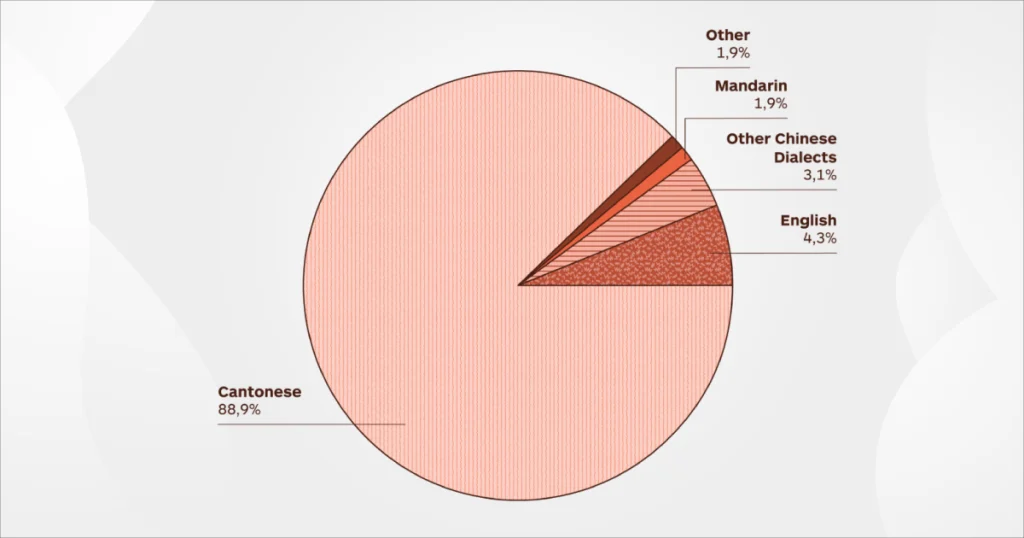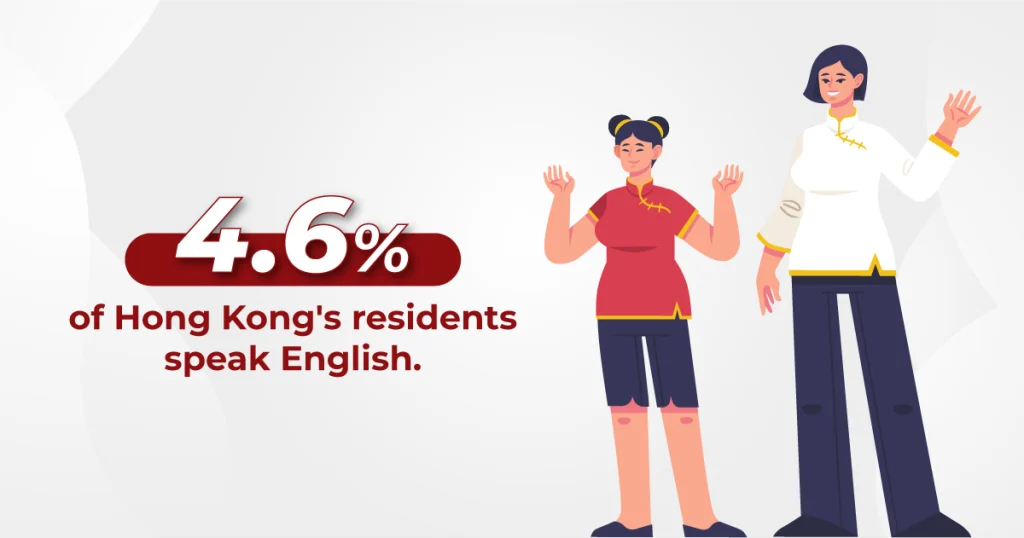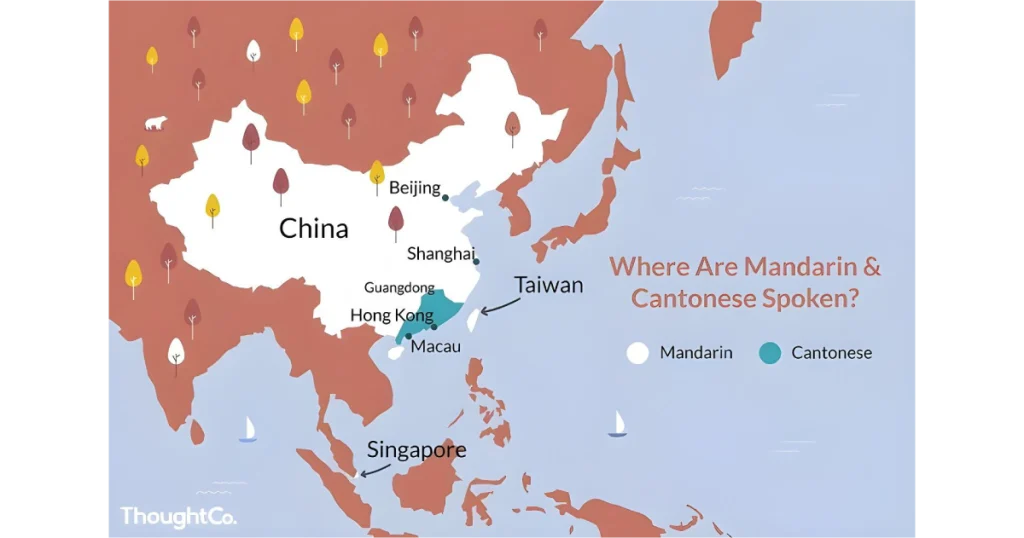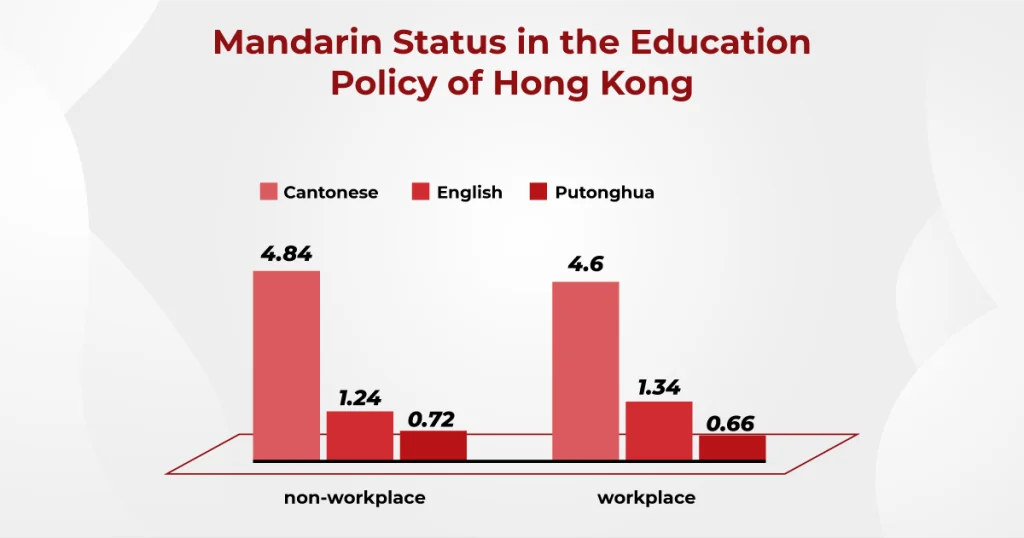Hong Kong is a city full of life, and its diverse mix of cultures is beautifully reflected in the languages spoken by its people. While 96% of people in Hong Kong speak Cantonese, the city has also embraced many more languages from around the world, creating a unique space where different traditions and cultures come together.
The languages spoken in Hong Kong tell the story of Hong Kong’s past, present, and its ever-evolving role on the global stage. So, what are the most common languages you’ll hear there, and how do they shape life in this vibrant city?
Let’s take a closer look at the history, significance, and cultural importance of the languages spoken by the people of Hong Kong.
A Brief Overview of Spoken Languages in Hong Kong
The Official Languages of Hong Kong: English and Chinese
Hong Kong operates under a dual official language policy that recognizes both English and Chinese.
As a former British colony, English has held official status in Hong Kong since 1883. This colonial influence has ingrained English into many aspects of life, including government, business, and education.
English is commonly used in the legal system, official documents, and many corporate environments, where it is often the preferred language for international trade and communication.
On the other hand, in 1974, the Cantonese dialect was formally recognized as an official language. Cantonese thrives particularly in local media, education, and community discourse.
In educational environments, while Cantonese is primarily used, English is extensively taught as a second language, especially in international schools and universities. Many institutions strive to offer a bilingual education framework, equipping students to excel in both local and global contexts.
Businesswise, English predominates in multinational companies and sectors that are heavily engaged in international trade, while Cantonese is more commonly used in local businesses and interactions.
Looking for Professional Chinese Translation Services? AsiaLocalize Has You Covered!
Cantonese: The Heart of Hong Kong’s Culture
Spoken by the vast majority of the population, Cantonese is the most commonly used language in Hong Kong. It serves as the primary medium of instruction in schools and is the language of daily life across the city, from bustling markets to lively neighborhoods.
Cantonese is rich in cultural nuances, reflected in its expressive tones and unique idioms. The language carries a wealth of proverbs and sayings that embody the values, philosophy, and humor of the local community.
Cantonese is not just a spoken language in Hong Kong; it is also written using traditional Chinese characters, which further reinforces the city’s cultural connection to its past.
The significance of Cantonese is also evident in local media, including television, radio, and print, where it dominates dramas, news, and entertainment.
The Rise of Mandarin in Hong Kong
Mandarin, or Putonghua, is the official language of the People’s Republic of China and has been gaining prominence in Hong Kong island, largely due to the city’s deepening ties with the mainland.
48% of Hong Kong’s inhabitants speak it, reflecting a significant uptick in its usage and acceptance among residents.
This increasing presence of Mandarin can be attributed to several factors, particularly in business and government settings. As Hong Kong continues to strengthen its economic and political connection with mainland China, Mandarin has become essential for effective communication and collaboration within various sectors.
Moreover, the role of Mandarin in education is becoming more pronounced. Schools are increasingly incorporating Mandarin into their curricula, often alongside Cantonese and English.
The influence of Mandarin is further manifesting in popular culture, media, and social interactions. With more exposure to mainland Chinese films, music, and social platforms, younger Hongkongers are more inclined to embrace Mandarin as part of their everyday communication.
The Role of Minority Dialects in Hong Kong
Especially in the rural areas and the new territories, minority dialects such as Hakka, Chiu Chow, and Weitou enter the picture. And they play a crucial role in preserving local culture and identity. For instance, Chiu Chow, with its distinct phonetic structure and expressions, carries the nuances of the Chaozhou culture, which ties back to Guangdong province.
However, these minority dialects are facing challenges as urbanization continues to reshape the demographic landscape of Hong Kong. Many young people migrate to urban centers for better opportunities, and as a result, the intergenerational transmission of these dialects is declining.
The influence of Mandarin, as it becomes more prevalent in education and business, further contributes to this decline, leading many to prioritize proficiency in Mandarin over their local dialects.
Despite these challenges, there are ongoing efforts to preserve these dialects and the cultural stories they carry.
Why Understanding Hong Kong’s Languages Matters for Businesses
While it’s obvious to go for Cantonese when tapping into Hong Kong’s market, many professionals in international business settings prefer English or, increasingly, Mandarin. So, it’s important to tailor communications to align with your needs and resonate with your potential audience. The goal is to deliver messages that aren’t just heard but understood and appreciated.
At AsiaLocalize, we operate from the heart of Asia, making us the perfect partner to help you navigate this linguistic and cultural diversity. For over 12 years, we’ve assisted thousands of clients in breaking into Asia’s dynamic markets, ensuring their messages align with local customs and values.
Our team of native translators, each with a minimum of 5 years of industry-specific experience, brings unmatched expertise to the table. With AsiaLocalize by your side, you can confidently deliver messages that make a lasting impact across the region.
| We build strong relationships with your potential in Hong Kong. Contact Us Now! |









